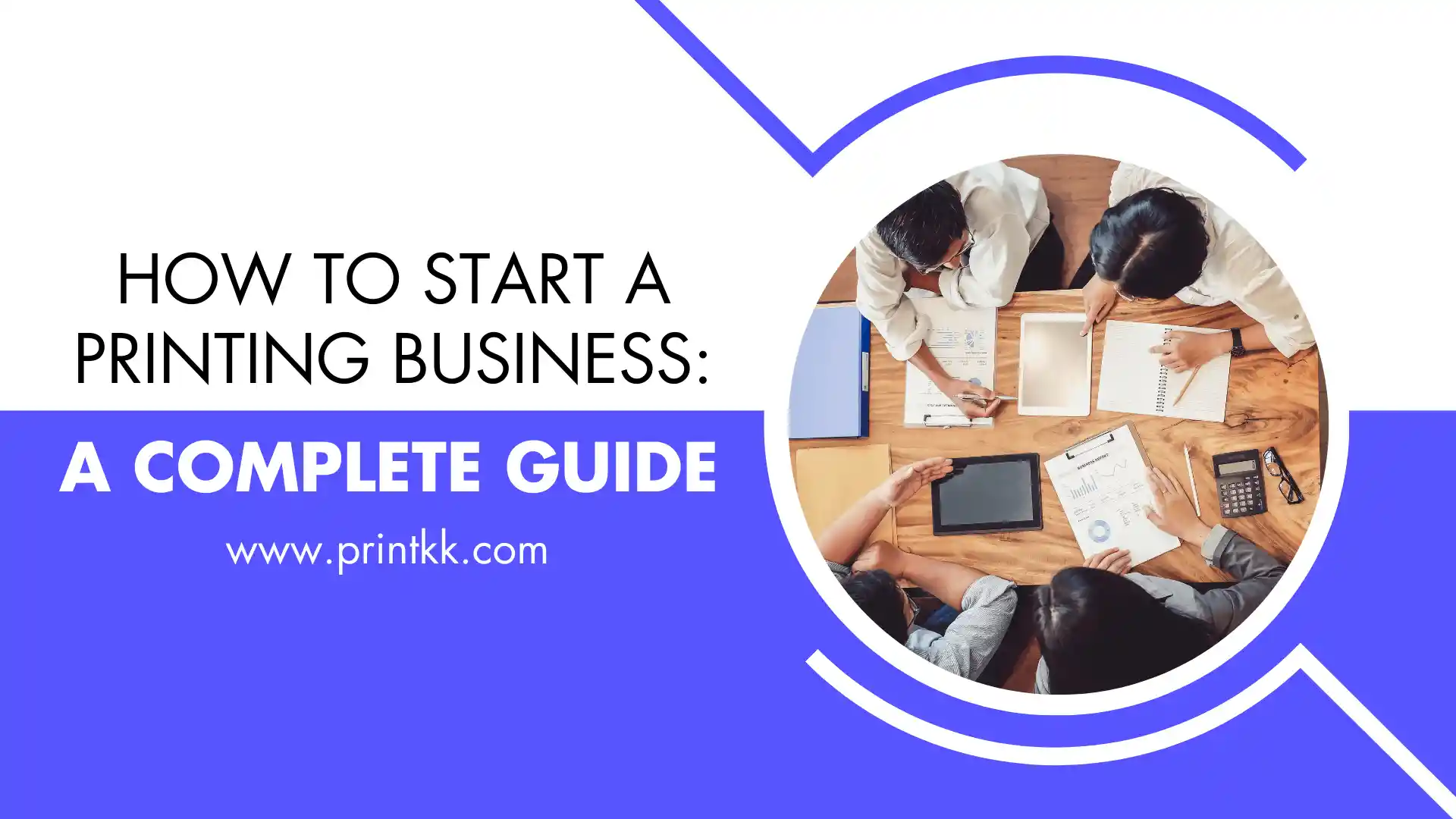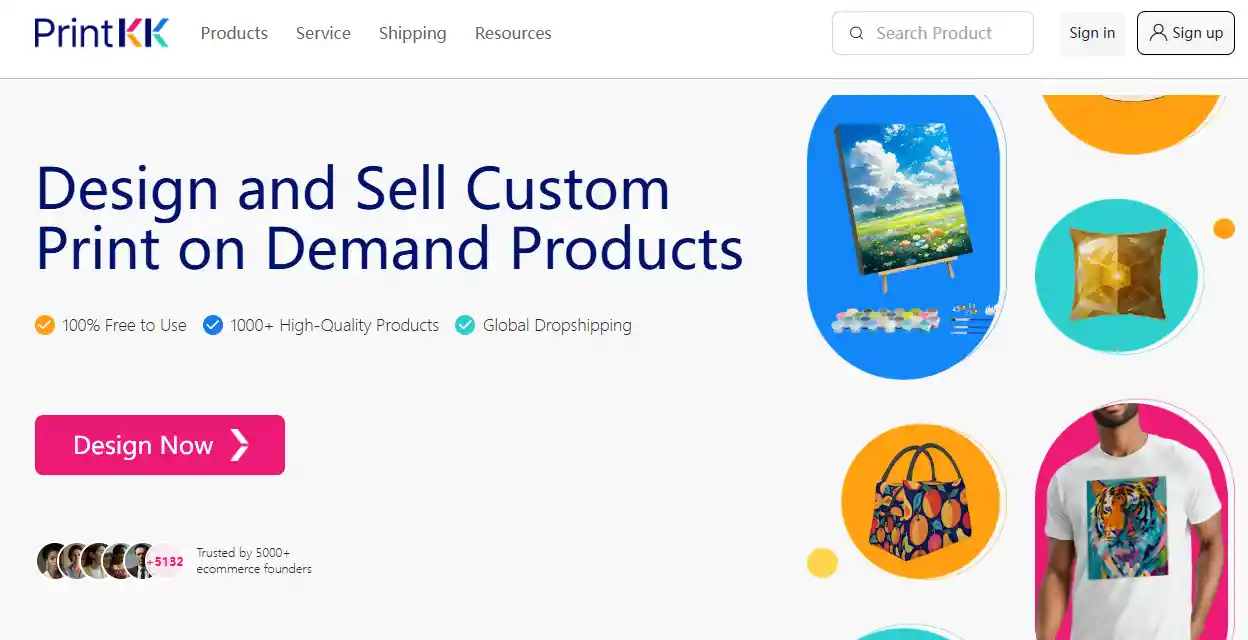
Thinking of launching a printing business in 2025 but don't know where to start? You're not alone. This guide is your first step towards turning that dream into a thriving reality. From choosing the right equipment to marketing your services, we'll walk you through every essential step. Ready to create a business that stands out and meets the market's needs? Let's dive in and make your entrepreneurial vision come to life!
Of course, if you can't wait to get to know the huge number of high-quality custom products, join PrintKK now and enjoy the personalized experience! Get our exclusive $5 coupon and save on your first order!

Why Should You Start a Printing Business?
Venturing into the printing business today offers numerous compelling reasons why it's a promising pursuit. At the heart of its appeal is the robust growth of the print-on-demand market, driven by a shift towards more personalized consumer experiences.
In an era where customization is king, entering the printing industry allows entrepreneurs to cater to this growing demand. From fashion to home decor, the desire for products that reflect individual style and preferences is surging, making now an opportune time to establish a footprint in this expanding niche.

Print On Demand Tripod Floor Lamp (Made in USA) - PrintKK
Moreover, the evolution of printing technology has democratized access to high-quality printing methods, enabling even small startups to produce products that rival those of established companies. Digital and 3D printing advancements have significantly reduced the cost barriers, making it feasible for newcomers to offer competitive, innovative products without substantial upfront investment.
Furthermore, the green technology and sustainability market is projected to grow significantly, reaching $61.9 billion by 2030. This growth is indicative of a broader trend towards sustainable practices and technologies across various sectors, driven by increasing consumer demand for environmentally friendly and sustainable products.
This technological revolution not only levels the playing field but also enhances the potential for creative expression and product diversity, broadening the market and inviting a wider audience to explore custom printed products. Whether for personal use or corporate branding, the demand spans a diverse spectrum of consumers, further underlining the printing business as a fertile ground for growth and innovation.

Print on Demand Reusable Paper Toiletry Bag - Storage Products - PrintKK
How to Start a Printing Business?
Starting your own printing business can be a profitable venture as it taps into the ever-growing demand for personalized products. From small-scale local artists to large corporate entities, the need for custom printed materials is expansive and diverse. Understanding the foundational steps to establish this type of business is crucial for aligning your operations with the market's needs.
Market Research and Business Planning
Conducting thorough market research is a critical first step in starting a printing business. This process helps you understand the competitive landscape, identify potential customers, and pinpoint market needs that your business could fulfill.
Start by analyzing the current market trends in the printing industry, such as the rising demand for eco-friendly printing solutions or the popularity of personalized products. Gathering this information allows you to tailor your offerings to meet specific demands, making your business more appealing to your target audience.
Following the market research, business planning becomes your roadmap to success. A comprehensive business plan outlines your business objectives, strategies for achieving them, financial projections, and marketing plans. Additionally, include a clear financial plan with startup costs, projected revenues, and a break-even analysis.
Crafting a detailed business plan ensures you have a structured approach to launching and growing your printing business, setting you on a path toward sustainable success.
 (1).jpg)
Choosing the Right Technology and Equipment
Selecting the right technology and equipment is foundational to launching a successful printing business. Entrepreneurs need to consider several factors such as the types of products they intend to offer, the volume of production, and their budget constraints.
For instance, digital printers are suitable for detailed and varied designs with rapid setup times, making them ideal for custom small batch orders. On the other hand, screen printing equipment suits larger runs and can be more cost-effective per unit, but involves higher setup costs and longer preparation times. It's essential to balance these factors with your anticipated order sizes and the versatility of your product offerings.
Furthermore, the choice of technology extends beyond printers. You will also need to invest in cutting machines for precision in product finishing, especially in the apparel and sticker markets. A heat press is another crucial piece of equipment for a business focused on garment printing.
Matching your equipment choices to your specific business needs will streamline operations and can significantly influence your business's ability to meet customer demands efficiently.

Location and Online Presence
Deciding on the right location and establishing a robust online presence are two crucial factors when starting a printing business. For physical location, consider the logistics necessary for production and delivery.
Additionally, your physical space should have enough room to house all necessary equipment and materials, as well as areas for the finishing and packing of products. A good location also means easier access for potential local clients and employees.
On the digital front, creating a strong online presence is essential. Start by developing a professional website that reflects your brand's ethos and showcases your products. This website should be optimized for search engines to attract more organic traffic.
Utilizing online marketing strategies such as SEO, content marketing, and online ads will also drive more traffic to your site and help convert visits into sales.
Legalities and Licenses
Navigating the legalities and securing the necessary licenses is a vital step in establishing a printing business. Before you start operations, it's important to research and comply with both local and federal regulations.These legal steps not only protect you from potential fines and legal issues but also legitimize your business in the eyes of customers and partners.
Additionally, consider the specific needs of a printing business. Depending on your location and the nature of your products, you might need to obtain special permits, especially if you use large machines or handle chemicals for screen printing.
Environmental regulations may also apply, particularly in terms of waste disposal and air quality standards. It's advisable to consult with a legal expert to navigate these areas thoroughly. This ensures that your business operates smoothly without infringing on any regulations, thereby safeguarding your investment and reputation in the long run.
What Equipment Do You Need to Start a Printing Business?
When starting a printing business, selecting the right equipment is paramount to your operation's success. Essential machinery includes printers, but the type you need varies based on your intended products and business scale.
For smaller, more detailed jobs like custom t-shirts or mugs, a high-quality digital printer is ideal. These are versatile and capable of handling various print materials and small orders with quick changeover times. For larger runs, such as posters or fabric printing, considering a screen printing setup might be more cost-effective. Both types of printers require specific maintenance and operational knowledge, so factor in training and operational setup time.
Custom Color Changing Mug (11oz) (Made in USA) - Print-On-Demand - PrintKK
Additionally, you'll need to invest in cutting machines for precision in product finishing, especially if dealing with vinyl or stickers. A heat press is crucial for transfer printing methods commonly used in apparel customization. Beyond the primary printing and cutting equipment, consider the workspace's layout.
Investing in software for design and customer management will also streamline the order process, from design proofs to final invoicing. These tools not only help in creating a robust production line but also enhance customer satisfaction through better service delivery.
Set up Your Online Print Business with PrintKK
Setting up your online printing business with PrintKK is an exciting venture that can open numerous opportunities for creativity and profit. To get started, first focus on designing an engaging and functional website. Your website is your primary sales platform where customers can view your products, make orders, and submit their designs. Use a clean, intuitive design that enhances user experience and includes features like a product gallery, customization tools, and an easy-to-navigate shopping cart.
Additionally, integrating strong SEO practices from the beginning will ensure your site ranks well in search results, attracting more traffic and potential sales.
With PrintKK, you can leverage dropshipping, which means products are printed and shipped directly to customers without needing to hold inventory. This setup reduces overhead costs and simplifies logistics.

Additionally, set up customer service protocols to handle inquiries and issues efficiently. This will help build a strong reputation and encourage repeat business and referrals from satisfied customers.
What's the Outlook of the Printing Industry in 2025?
The outlook for the printing industry in 2025 is shaping up to be both dynamic and promising, driven by technological advancements and changing consumer demands. As digital technology continues to evolve, it offers new capabilities for personalization and efficiency that are transforming traditional printing.
With these innovations, small businesses and entrepreneurs can enter the market more easily, offering customized products without the need for large upfront investments in inventory.
Furthermore, sustainability is becoming a significant factor in the growth of the printing industry. Consumers and businesses alike are showing a preference for eco-friendly printing options.

Custom Folding Reusable Shopping Bags - Print on Demand Fulfillment - PrintKK
As a result, companies that prioritize environmental responsibility are likely to gain a competitive edge. The industry is also seeing a trend towards merging digital and physical marketing strategies, with printed materials complementing digital campaigns, highlighting the continued relevance of print in a digital age. This holistic approach to marketing is expected to open new avenues for growth and innovation within the printing sector.
 (1).jpg)
Conclusion
Venturing into the printing business in 2025 presents a plethora of opportunities alongside significant challenges. As we conclude, it's essential to reflect on the key insights shared in this guide. Furthermore, embracing sustainable practices and digital integration can significantly enhance your competitive edge. As you move forward, remember the importance of continuously learning and adapting to industry changes.
By following the guidance provided in this blog, you are better equipped to start a printing business that stands out in the modern digital era. Good luck on your entrepreneurial journey, where creativity meets innovation in every print!
FAQs
What do you need for printing business?
Starting a printing business requires a solid setup: a reliable printer (digital or screen depending on your focus), cutting machines for detailed work, and a heat press for apparel. Software for managing orders and customer designs is also essential.
How do you start your own printing business?
To start your own printing business, identify a niche, craft a business plan, secure funding, choose the right equipment, and develop an online presence to reach your target market effectively.
Is it good to start a printing business?
Starting a printing business can be a profitable venture due to high demand for customized products, from apparel to promotional items, and low entry barriers with print-on-demand models.
How to grow your printing business?
To expand your printing business, focus on enhancing your online presence, diversifying product offerings, and building partnerships with designers and local businesses. Also, regularly update technology to improve quality and efficiency.










 Global Shipping
Global Shipping




























